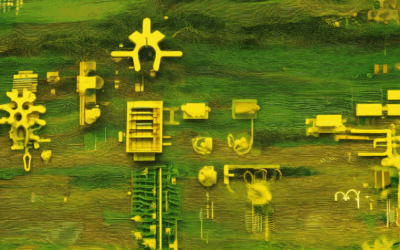As the business world continues to evolve, technology has become a cornerstone of success, offering innovative solutions to meet the demands of a rapidly changing market. In 2025, the landscape is poised to transform further, with cutting-edge advancements promising to redefine how businesses operate. From streamlining operations to enhancing customer experiences, tech solutions are becoming indispensable tools for modern enterprises aiming to stay ahead of the curve. This exploration delves into the latest trends, tools, and strategies that are shaping the future of business technology, providing actionable insights for companies ready to embrace the next generation of innovation.
Key Takeaways
- Artificial Intelligence (AI): Revolutionizes industries through machine learning, natural language processing, and predictive analytics.
- Machine Learning (ML): Empowers systems to learn and adapt by analyzing vast amounts of data and improving decision-making processes.
- Robotic Process Automation (RPA): Streamlines workflows by automating repetitive tasks across various software applications and systems.
- Blockchain Technology: Provides secure, decentralized ledgers for transactions and data storage, enabling trust and transparency in global supply chains and financial systems.
- Internet of Things (IoT): Connecting devices, vehicles, and infrastructure to collect and analyze real-time data, enhancing efficiency and decision-making capabilities.
- AI and Machine Learning: AI continues to advance rapidly, with developments in natural language processing, autonomous systems, and personalized healthcare.
- Quantum Computing: Quantum computers promise to solve complex problems much faster than classical computers, with IBM and Google leading the charge.
- Biotechnology and Genomics: CRISPR technology and synthetic biology transform biotech, offering novel treatments and enhanced agricultural productivity.
- Metaverse Technologies: The metaverse becomes increasingly immersive, with advancements in VR, AR, and spatial computing.
- Web3 and Blockchain: Decentralized applications challenge traditional centralized systems, enabled by blockchain technology.
- Sustainability and Green Tech: Tech companies focus on renewable energy, electric vehicles, and carbon capture to address climate change.
- Space Exploration: Private companies like SpaceX and Blue Origin drive commercial space travel and lunar base establishment.
- Neurotechnology: Developments in brain-computer interfaces redefine human capabilities and medical treatments.
- Artificial Intelligence (AI): Expected to dominate with generative AI, NLP, and autonomous systems.
- Quantum Computing: Becomes more accessible and powerful, promising breakthroughs in cryptography and optimization.
- Renewable Energy Solutions: Solar and wind turbines become more efficient, supported by improved storage technologies.
- Autonomous Vehicles: Self-driving cars get closer to reality with enhanced safety and urban integration.
- Biotechnology and Gene Editing: CRISPR-Cas9 advances, enabling precise DNA modifications for treating genetic disorders.
- Metaverse and Virtual Reality (VR): Expands with better hardware and applications in gaming and virtual collaboration.
- Advanced Materials Science: New materials like carbon nanotubes and graphene revolutionize industries.
- Space Exploration: Continues with ambitious plans for Mars colonization and deep-space exploration.
- Advanced Manufacturing Techniques: Innovate production processes.
- Neural Interface Technologies: Explore brain-computer interfaces for medical advancements.
- AI-Driven Healthcare Diagnostics: Enhance accuracy and accessibility.
- Sustainable Agriculture: Leverage technology for increased productivity.
- Smart Cities and IoT Integration: Enhance urban living with connected systems.

What Are Business Technology Solutions?
Business technology solutions encompass a wide range of tools, software, and systems designed to optimize and streamline business operations. These solutions aim to enhance productivity, improve decision-making, and drive innovation across various departments. Below is a breakdown of key categories and examples:
1. Productivity Tools
These solutions help employees work more efficiently and collaborate effectively. Examples include:
- Project management software (e.g., Iterati )
- Collaboration platforms
- Document management systems
- Time tracking and resource management tools
2. Customer Engagement Platforms
These solutions help businesses interact with customers more effectively. Examples include:
- CMS (Content Management Systems)
- Email marketing tools
- Social media management platforms
- Customer relationship management (CRM) systems
3. Supply Chain and Logistics Solutions
These solutions streamline inventory management and logistics. Examples include:
- ERP (Enterprise Resource Planning) systems
- Inventory management software
- Transportation and fleet management tools
- Supply chain analytics platforms
4. Analytics and Business Intelligence Tools
These solutions provide insights to drive informed decisions. Examples include:
- BI (Business Intelligence) tools
- Data visualization software
- Predictive analytics platforms
- Customer insights and market research tools
Why Businesses Adopt Business Technology Solutions
Organizations adopt these solutions to:
- Improve operational efficiency
- Reduce costs
- Enhance scalability
- Gain a competitive edge
Future Trends in Business Technology
As technology continues to evolve, so do business solutions. Key trends include:
- AI (Artificial Intelligence) integration
- Cloud-based solutions
- IoT (Internet of Things) applications
- Blockchain technology for secure operations
By leveraging these solutions, businesses can stay ahead in a rapidly changing market. To learn more about how Iterati can help optimize your operations, visit our website today.
Examples of Technical Solutions
Technical solutions encompass a wide range of tools and systems designed to address specific challenges and enhance efficiency. Here are some notable examples:
- Cloud Computing : Platforms like AWS, Azure, and Google Cloud provide scalable infrastructure solutions for businesses.
- Customer Relationship Management (CRM) : Systems such as Salesforce, HubSpot, and Zoho help manage customer interactions and relationships.
- Cybersecurity : Tools like CrowdStrike, FireEye, and Palo Alto Networks protect against cyber threats and breaches.
- Data Management : Databases such as Snowflake, MongoDB, and DataBricks enable efficient data storage and analysis.
- Project Collaboration : Platforms like Slack, Microsoft Teams, and Trello facilitate teamwork and project management.
- Software Development : Frameworks and tools like React, Node.js, Jenkins, and Docker accelerate software development processes.
- Emerging Technologies : Solutions like AI-powered chatbots, IoT platforms (AWS IoT, Azure IoT), and blockchain platforms (Hyperledger, Ethereum) are transforming industries.
These technical solutions not only solve specific problems but also drive innovation and productivity across various sectors. By leveraging these tools, organizations can streamline operations, enhance decision-making, and deliver better outcomes to their stakeholders.

What Technology Can Improve a Business?
Technology plays a pivotal role in driving innovation, efficiency, and growth within businesses. By leveraging advanced tools and systems, companies can streamline operations, enhance decision-making, and deliver superior customer experiences. Here are some key technologies that can significantly boost a business’s performance:
- Data Analytics : Transform raw data into actionable insights using tools like AWS Analytics or Google Cloud Analytics. This enables businesses to identify trends, optimize processes, and make informed decisions.
- Artificial Intelligence (AI) and Machine Learning : Implement AI-driven solutions such as IBM Watson to automate tasks, predict customer behavior, and enhance operational efficiency.
- Cloud Computing : Migrate IT infrastructure to the cloud with services like Microsoft Azure or Google Cloud Platform to reduce costs, improve scalability, and access enterprise-level tools.
- Internet of Things (IoT) : Integrate IoT devices to monitor operations, optimize supply chains, and improve asset management, often supported by platforms like Siemens Digital Industries.
- Cybersecurity : Protect sensitive data and systems with solutions from Palo Alto Networks or CrowdStrike to safeguard against cyber threats and ensure compliance with regulations.
- Blockchain : Utilize blockchain technology, as offered by Hyperledger Fabric, to create secure, decentralized systems for supply chain management and transaction processing.
- Augmented/Virtual Reality (AR/VR) : Enhance training programs and customer experiences with AR/VR solutions from Oculus or Microsoft HoloLens to provide immersive learning and visualization capabilities.
- Automation and Robotics : Deploy robotic process automation (RPA) tools like UiPath to automate repetitive tasks, reducing errors and increasing productivity.
- Collaboration Tools : Empower teams with collaboration platforms like Slack or Microsoft Teams to foster communication, productivity, and real-time project management.
By adopting these technologies, businesses can position themselves as industry leaders, drive innovation, and achieve long-term success in a rapidly evolving market landscape.

Top 5 Advanced Technologies
- Artificial Intelligence (AI) – Revolutionizing industries through machine learning, natural language processing, and predictive analytics.
- Machine Learning (ML) – Empowering systems to learn and adapt by analyzing vast amounts of data and improving decision-making processes.
- Robotic Process Automation (RPA) – Streamlining workflows by automating repetitive tasks across various software applications and systems.
- Blockchain Technology – Providing secure, decentralized ledgers for transactions and data storage, enabling trust and transparency in global supply chains and financial systems.
- Internet of Things (IoT) – Connecting devices, vehicles, and infrastructure to collect and analyze real-time data, enhancing efficiency and decision-making capabilities.
Next Big Thing in Tech
The next big thing in tech is likely to be AI-driven innovation, quantum computing advancements, biotechnology breakthroughs, and the continued growth of metaverse technologies. These areas are currently leading the charge in shaping the future of technology.
- AI and Machine Learning : AI continues to advance rapidly, with developments in natural language processing, autonomous systems, and personalized healthcare. Companies like OpenAI and Anthropic are pushing the boundaries of what’s possible with AI.
- Quantum Computing : Quantum computers promise to solve complex problems much faster than classical computers. IBM and Google have already demonstrated quantum supremacy, and as the technology matures, it could revolutionize fields like cryptography, optimization, and drug discovery.
- Biotechnology and Genomics : CRISPR technology and synthetic biology are transforming biotech. Startups and major corporations are leveraging these tools to develop novel treatments, enhance agricultural productivity, and explore synthetic organisms.
- Metaverse Technologies : The metaverse is becoming increasingly immersive, with advancements in VR, AR, and spatial computing. Companies like Meta (formerly Facebook) are investing heavily in this space, aiming to create virtual environments for work, entertainment, and social interaction.
- Web3 and Blockchain : Decentralized applications are challenging traditional centralized systems. Blockchain technology is enabling new ways of managing data, money, and contracts. Platforms like Dapper and Coinbase are leading the charge in building the infrastructure for Web3.
- Sustainability and Green Tech : Tech companies are increasingly focusing on sustainability. Innovations in renewable energy, electric vehicles, and carbon capture are expected to play a significant role in addressing climate change.
- Space Exploration : Private companies like SpaceX and Blue Origin are driving the next phase of space exploration. Commercial space travel and the establishment of lunar bases are becoming more feasible, opening up new possibilities for humanity.
- Neurotechnology : Developments in brain-computer interfaces and neuroprosthetics could redefine human capabilities. Companies like Neuralink are exploring ways to integrate technology with the brain, potentially leading to groundbreaking advancements in medical treatments and human enhancement.
These technologies are not just trends—they are transformative forces that will shape the future of our world. Staying informed about these innovations will be essential for anyone looking to navigate the evolving landscape of technology.

New Technologies Emerging in 2025
The year 2025 promises to bring a wave of groundbreaking technological advancements across various industries. Here are some of the most anticipated innovations:
- Artificial Intelligence (AI): AI is expected to become more integrated and intelligent. Developments in generative AI, natural language processing (NLP), and autonomous systems will likely dominate the landscape. Companies like OpenAI and Anthropic are pushing the boundaries of AI applications in healthcare, education, and entertainment.
- Quantum Computing: Quantum computers are set to become more accessible and powerful. IBM and Google continue to lead in quantum hardware development, promising breakthroughs in cryptography, optimization, and drug discovery.
- Renewable Energy Solutions: Solar panels and wind turbines will become more efficient, and storage technologies like solid-state batteries will improve. Governments and corporations are investing heavily in green energy infrastructure to combat climate change.
- Autonomous Vehicles: Self-driving cars are getting closer to reality. Major automakers like Tesla, Waymo, and traditional car manufacturers are racing to perfect autonomous driving systems, with improved safety features and better integration into urban environments.
- Biotechnology and Gene Editing: CRISPR-Cas9 technology will continue to advance, enabling precise modifications in human DNA. Clinical trials for treating genetic disorders and enhancing agricultural resilience are expected to yield significant results.
- Metaverse and Virtual Reality (VR): The metaverse will see further expansion, with advancements in VR hardware, software, and connectivity. Applications in gaming, virtual collaboration, and virtual tourism will grow increasingly popular.
- Advanced Materials Science: New materials, such as carbon nanotubes and graphene, will find applications in electronics, construction, and energy storage. These materials promise to revolutionize industries through their unique properties.
- Space Exploration: Private companies like SpaceX and Blue Origin will continue their ambitious plans for Mars colonization and deep-space exploration. Technological innovations in spacecraft design and propulsion systems will drive these efforts.
In addition to these areas, expect to see advancements in:
- Advanced manufacturing techniques
- Neural interface technologies
- AI-driven healthcare diagnostics
- Sustainable agriculture practices
- Smart cities and IoT integration
The convergence of these technologies will undoubtedly shape the future of humanity, driving progress in nearly every sector of our lives. Stay tuned for more updates as we countdown to 2025!




0 Comments